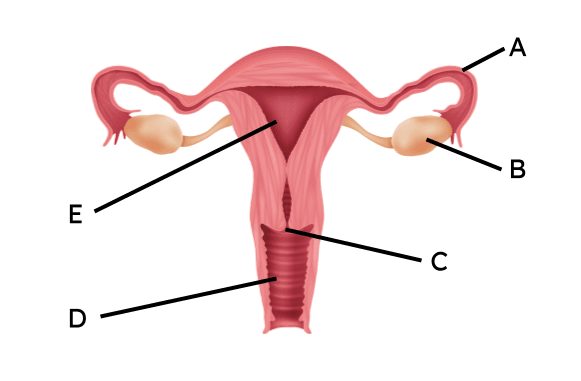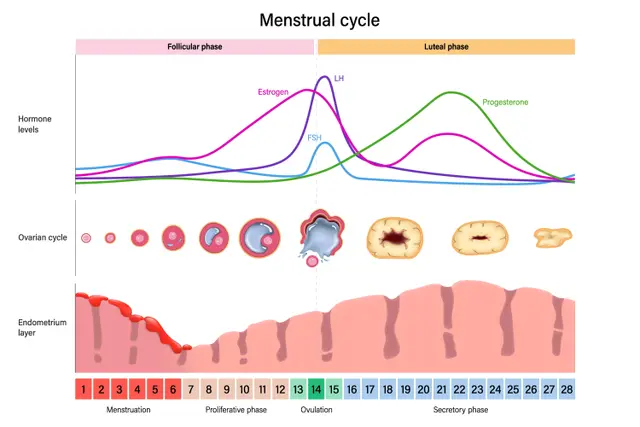Myths about teaching can hold you back
- Year 11
- AQA
- Higher
Hormonal control of the menstrual cycle
I can explain the roles of FSH, LH, oestrogen and progesterone in controlling the menstrual cycle in human females.
- Year 11
- AQA
- Higher
Hormonal control of the menstrual cycle
I can explain the roles of FSH, LH, oestrogen and progesterone in controlling the menstrual cycle in human females.
These resources were made for remote use during the pandemic, not classroom teaching.
Switch to our new teaching resources now - designed by teachers and leading subject experts, and tested in classrooms.
Lesson details
Key learning points
- FSH causes follicle maturation and secretion of oestrogen by the ovaries.
- Oestrogen causes thickening of uterus wall, secretion of LH by the pituitary gland and inhibits the release of FSH.
- LH causes ovulation; FSH and LH cause the mature follicle to break down and secrete progesterone.
- Progesterone prepares uterus lining for implantation of fertilised egg; stops secretion of LH & FSH by pituitary gland.
- Fall in progesterone causes menstruation.
Keywords
FSH - follicle stimulating hormone, causes the follicle containing an egg to mature
LH - luteinising hormone causes ovulation
Oestrogen - a hormone that causes thickening of the uterus lining and the release of LH from the pituitary gland
Progesterone - maintains the uterus lining and stops the release of FSH and LH from the pituitary gland
Ovulation - the release of an egg from a mature follicle in the ovaries
Common misconception
That the menstrual cycle is not linked with reproduction; that hormones only control mood.
Diagrams to show the clear effect of hormones on changes in the menstrual cycle and discuss the importance of the process to fertilisation.
To help you plan your year 11 biology lesson on: Hormonal control of the menstrual cycle, download all teaching resources for free and adapt to suit your pupils' needs...
To help you plan your year 11 biology lesson on: Hormonal control of the menstrual cycle, download all teaching resources for free and adapt to suit your pupils' needs.
The starter quiz will activate and check your pupils' prior knowledge, with versions available both with and without answers in PDF format.
We use learning cycles to break down learning into key concepts or ideas linked to the learning outcome. Each learning cycle features explanations with checks for understanding and practice tasks with feedback. All of this is found in our slide decks, ready for you to download and edit. The practice tasks are also available as printable worksheets and some lessons have additional materials with extra material you might need for teaching the lesson.
The assessment exit quiz will test your pupils' understanding of the key learning points.
Our video is a tool for planning, showing how other teachers might teach the lesson, offering helpful tips, modelled explanations and inspiration for your own delivery in the classroom. Plus, you can set it as homework or revision for pupils and keep their learning on track by sharing an online pupil version of this lesson.
Explore more key stage 4 biology lessons from the Hormones and human reproduction unit, dive into the full secondary biology curriculum, or learn more about lesson planning.

Equipment
None required.
Licence
Prior knowledge starter quiz
6 Questions
Q1.What is menstruation?
Q2.What is the name given to an egg being released from an ovary?
Q3.Which of the following about hormones are true?
Q4.Match the part to its name.

fallopian tube
ovary
cervix
vagina
uterus
Q5.What does fertilisation produce?
Q6.Put these in order of development.
Assessment exit quiz
6 Questions
Q1.What are the effects of FSH?
Q2.Put these steps of the menstrual cycle in the correct order.
Q3.Which hormone causes ovulation to take place?
Q4.Which hormones cause the mature follicle to break down and secrete progesterone?
Q5.A fall in which hormone triggers menstruation?
Q6.Order the steps.



